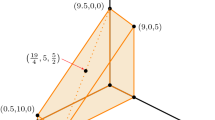Abstract
A bargaining solution concept which generalizes the Nash bargaining solution and the Shapley NTU value is defined for cooperative games with incomplete information. These bargaining solutions are efficient and equitable when interpersonal comparisons are made in terms of certainvirtual utility scales. A player's virtual utility differs from his real utility by exaggerating the difference from the preferences of false types that jeopardize his true type. In any incentive-efficient mechanism, the players always maximize their total virtual utility ex post. Conditionally-transferable virtual utility is the strongest possible transferability assumption for games with incomplete information.
Similar content being viewed by others
References
D'Aspremont, C., andL.-A. Gerard-Varet: Incentives and Incomplete Information. Journal of Public Economics11, 1979, 25–45.
Harsanyi, J.C.: Simplified Bargaining Model for the n-Person Cooperative Game. International Economic Review4, 1963, 194–220.
—: Games with Incomplete Information Played by “Bayesian” Players. Management Science14, 1967–1968, 159–189, 320–334, 486–502.
Harsanyi, J.C., andR. Selten: A Generalized Nash Bargaining Solution for Two-Person Games with Incomplete Information. Management Science18, 1972, P80-P106.
Holmström, B., andR.B. Myerson: Efficient and Durable Decision Rules with Incomplete Information. Econometrica51, 1983, 1799–1819.
Kakutani, S.: A Generalization of Brouwer's Fixed Point Theorem. Duke Journal of Mathematics8, 1941, 457–459.
Myerson, R.B.: Incentive Compatibility and the Bargaining Problem. Econometrica47, 1979, 61–73.
—: Mechanism Design by an Informed Principal. Econometrica51, 1983, 1767–1797.
—: Two-Person Bargaining Problems with Incomplete Information. Mimeo, Northwestern University, Evanston 1982. (To appear in Econometrica.)
Nash, J.F.: The Bargaining Problem. Econometrica18, 1950, 155–162.
—: Two-Person Cooperative Games. Econometrica21, 1953, 128–140.
Roth, A.E.: Values for Games Without Sidepayments: Some Difficulties with Current Concepts. Econometrica48, 1980, 457–465.
Shafer, W.J.: On the Existence and Interpretation of Value Allocation. Econometrica48, 1980, 467–476.
Shapley, L.S.: A Value forn-Person Games. In: Contributions to the Theory of Games II. Ed. by H.W. Kuhn, and A.W. Tucker. Princeton 1953, 307–317.
-: Utility Comparison and the Theory of Games. In: La Decision. Paris 1969, 251–263.
Shapley, L.S., andM. Shubik: Game Theory in Economics — Chapter 6: Characteristic Function, Core, and Stable Set. Santa Monica 1973.
Author information
Authors and Affiliations
Additional information
Research for this paper was supported by the Kellogg Center for Advanced Study in Managerial Economics and Decision Sciences, and by a research fellowship from I.B.M.
Rights and permissions
About this article
Cite this article
Myerson, R.B. Cooperative games with imcomplete information. Int J Game Theory 13, 69–96 (1984). https://doi.org/10.1007/BF01769817
Received:
Revised:
Issue Date:
DOI: https://doi.org/10.1007/BF01769817




